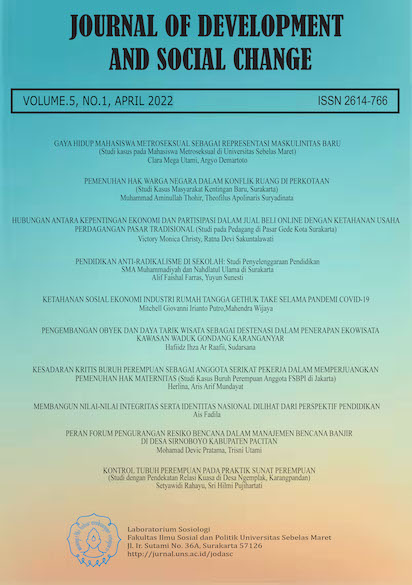POLA PEMBINAAN SISWA DI SEKOLAH LUAR BIASA/AYAYASAN KESEJAHTERAAN ANAK-ANAK BUTA SURAKARTA DALAM MEMBENTUK KESADARAN SOSIAL, KRETIFITAS DAN KETERAMPILAN
Abstract
This research aims to (1) know the role of family in everyday life for children and Blind in the SLB/A YKAB Surakarta City. (2) Know the pattern of coaching conducted by SLB/A YKAB Surakarta City for children with the blind in the foundation. (3) Knowing the efforts made to foster social awareness and creativity for the blind child who is in SLB/A-YKAB Surakarta city. This research is a type of qualitative descriptive research. The data collection techniques used are observations not participating and in-depth interviews. This research used Role Theory by Robert Linton. Role Theory is a combination of theory, orientation, and scientific discipline other than psychology. Role theory begins and it is still used in sociology and anthropology (Sarwono, 2002). and then it is also used Social Capital Theory by Fukuyama. This theory consists some elements like trust, reciprocal, social network, social interaction, norm and responsibility. The informant used as a data source in this research is 1 from the party of SLB/A YKAB Foundation, 3 persons SLB/A YKAB, 4 children of blind students who are built in SLB/A YKAB, 1 person in the dorm, 2 parents, 1 people who are around SLB/A YKAB. The informant selection technique is done by purposive sampling technique. The date analysis techniques used consist of four phases: data collection, data reduction, data presentation, and conclusion withdrawal.
The results of this research show that (1) SLB/A YKAB Surakarta City provides guidance for students with visual impairments using a trust factor, which is to be parents who give attention and affection like their biological parents. Then the responsibility factor being a teacher who provides knowledge and learning in accordance with their education level. (2) In addition to the social network factor, students are given additional material in the form of Mobility Orientation. (3) And in fostering social awareness in accordance with the factors of social interaction is by inviting students to interact with the surrounding community as in mobility orientation subject, students are invited to leave the school environment and interact with the general public outside the school environment and given additional extracurricular lessons such as music, massage and sports such as tennis.
Full Text:
PDFReferences
Tuegeh, J; Rompas, F; Ransun, D (2012). Peran Keluarga Dalam Memandirikan Anak Retardasi Mental di Yayasan Pembinaan Anak Cacat Manado Tahun 2011. Diakses dari https://ejurnal.poltekkesmanado.ac.id/index.php/jpd/article/view/137
Sari, P.D (2018). Implementasi Program Bina Diri Untuk Kemandirian Anak Tunagrahita di Yayasan Pembinaan Anak Cacat (YPAC) Medan. Diakses dari http://repositori.usu.ac.id/bitstream/handle/123456789/5707/140902047.pdf?sequence=1&isAllowed=y
https://geotimes.co.id/opini/mengenal-anak-berkebutuhan-khusus/
DOI: https://doi.org/10.20961/jodasc.v2i2.41664
Refbacks
- There are currently no refbacks.




